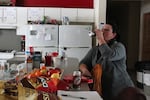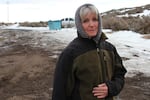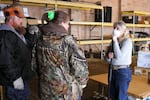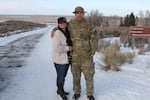
Debra Bass, left, and Melissa Cooper plan meals together. They are the two leading women figures of the occupation.
Amanda Peacher / OPB
Kristi Jernigan arrived alone at the Redmond airport from Tennessee with nothing but a carry-on bag and her Bible. This was the 44-year-old soccer mom’s first trip out west, and she didn’t know what to expect when she arrived at the Malheur National Wildlife Refuge during the second week of the armed occupation.
“I just knew that God said, ‘Go,” said Jernigan, a Christian missionary. “He didn’t say how to go, or why to go, he just said go.”
Her frustrations with the federal government had been percolating for some time. Finally, here was an opportunity to protest what she sees as federal oppression and to simultaneously “edify, lift up and exhort people in Christ.”
Jernigan joined the handful of women occupiers at the refuge who had come from places like Idaho, Nevada and Arizona. Some showed up with their men; others alone. Some left children back home. They come from different backgrounds and different faiths but they’re united in what they see as a calling: they believe the federal government has gone too far and they’re here to make a hard stand.
Related: Malheur Occupation: A Reference Guide
For the women, that hard stand comes by way of peeling potatoes and sorting laundry.
While the men militants give the press briefings, lecture reporters on the constitution, and stand guard with semi-automatic rifles, the women sort incoming supplies, make giant pots of chili and wash clothes. The kitchen is the social hub of their occupation. They sing, lounge on couches and share stories in the bunkhouse that once housed seasonal wildlife refuge volunteers. The women tend to be pro-gun rights and anti-federal government, but unlike the men, you rarely see them armed.
They see themselves as vital support for the armed men guarding the complex.
“They need women here. These guys go out there and sit in this cold, in two degrees. They’re out there protecting me,” said Melissa Cooper, a former warehouse worker and mother of three from Arizona. She’s here with husband Blaine Cooper, who is often at militia leader Ammon Bundy’s side in camouflage fatigues.
Cooper is clearly the woman in charge at the bunkhouse. Her dark hair is often swept into a ponytail while she bustles around, cleaning, giving orders or handing out bumper stickers that read “Bye Bye BLM.”

Melissa Cooper chugs an energy drink while planning the next meal. Cooper is in charge of sorting supplies, cooking, and setting up new arrivals with a place to sleep. "I'm tired. I'm getting four hours of sleep a night," she said.
Amanda Peacher / OPB
On a mellow afternoon last week, Cooper leaned against the kitchen counter eating cold soup from a plastic container. She turned toward Debra Bass to talk about that evening’s dinner: beef stroganoff and baked potatoes.
“We’ve got lots and lots of sour cream,” said Cooper. “I need to see about getting those pasta noodles that you want,” she said. She wrote down “egg noodles” on a grocery list sitting on the counter.
“That’s good. What do you think about cooking up some bacon, and getting it real crisp?” said Bass, while scrubbing the kitchen sink with a rough sponge.
Bass, a 61-year-old former sheriff’s deputy and Air Force Veteran from Nevada, has been in Harney County since early December. (She’s also known as Debra Carter Pope, but recently reverted to her maiden name.) She and her fiancé were part of the original group that came early to meet with Dwight and Steven Hammond, the local ranchers convicted of arson.
Like many here, Bass is vocal about her opposition to federal ownership of public lands and she wants to see the Hammonds out of prison. “I’ve seen the federal government run out at least three ranchers in my community, to turn their lands into a wildlife refuge,” said Bass.
While Cooper acts as commander in chief of the kitchen, Bass is a quieter second. She sweeps and cooks and cleans in the background, every so often stealing away to the outdoor campfire for a cigarette. The smoking also gives her a break from kitchen work. She’s still recovering from recent neck surgery, and said she tires easily.

Debra Bass is an Air Force veteran and former deputy sheriff. She came originally because there was a "tug in her heart" for ranchers Dwight and Steven Hammond, who are now in prison for arson. She stayed because she wants to see the refuge and other federal lands turned over to local control.
Amanda Peacher / OPB
Like the other veteran occupiers, she often refers back to her service oath swearing to defend the Constitution. “There’s no expiration date on that oath. I served in the military to keep America safe,” said Bass.
Now, she sees herself as fighting tyranny. “I’m hoping that us making a stand will open the eyes of others across the nation and let them know that they can do the same thing,” said Bass.
Cooper and Bass met this month, but they tease and interact like family. “I kind of adopted her," said Bass. “She’s like a third daughter.”
For the first couple of weeks of the occupation, visitors came freely to the bunkhouse, although Cooper kept a watchful eye on those who came and went. The women offered visitors hot coffee or homemade fudge sent by a supporter, and allowed reporters to sit in for short stints in the bunkhouse.
When two tired looking men from Nevada straggled through the door of the bunkhouse Cooper strode to greet them.
“Hello, I’m Melissa Cooper. You guys here to check things out? Please sign in on my guest list,” she said, directing to a spiral notebook on the counter.
Although Cooper plays head cook here, she is also a vigilante in her own right. She said she was at the Bundy Ranch in Nevada during the 2014 standoff with the Bureau of Land Management. She recently participated in armed citizen border patrols to prevent undocumented immigrants from crossing into the U.S.
Just a few days into the occupation, she transformed an exercise room for the refuge employees into an organized stock room. Cooper instructed a few men to bring shelves from other buildings to house the militants’ growing supplies. The shelves were then neatly labeled in her elegant cursive writing.

The supply room in the occupied refuge on Jan. 14.
Amanda Peacher / OPB
That same handwriting appeared on signs taped throughout the bunkhouse: “No Cigarettes on Ground. Thank you.” “No Chew on Ground. Thank you.” “Please keep voices low. Men and Women Sleeping.”
Once the men from Nevada were settled with a hot drink, Cooper turned her attention to organizing a plastic tote of recent donations, some of the many supplies that continue to stream in from across the country. “Ooh, we got some lotion finally! We need some lotion bad,” she said.
She sorted toothbrushes, bars of soap, wipes and nail clippers. “Here’s some more chapstick,” Cooper said, her voice excited. “Dental floss! It’s the little things that count.”
Cooper said she quit her job to come to Oregon and she said she was “here for the long haul.”
The protesters had grilled cheese for lunch in the occupied kitchen. #BurnsOregon pic.twitter.com/7SIvGlAcUg
— Amanda Peacher (@amandapeacher) January 5, 2016
But then there are women like Kristi Jernigan, the Christian missionary from Tennessee, who came and left the occupation spontaneously. Jernigan, who wore a knit beanie over short blonde hair, said she was compelled by Ammon Bundy’s call for recruits.
“He was asking two questions: Is this a righteous cause? And number two, does God work through people?” Jernigan said, while sweeping the floor of the bunkhouse.
“We’re not anti-government,” she said. “We just want the system to work the way the Constitution has put forth.”
Jernigen wanted nothing to do with the tactics and security operations of the occupation. She asked militants not to discuss such things in her presence.
“I am here strictly to bring people to salvation if that is God’s will,” she said. She sang hymns while running the vacuum cleaner through the common areas and said she hopes to organize a regular Bible study.

"I was always taught that cleanliness is next to Godliness," says Kristi Jernigan. She says the women sweep and mop the refuge bunkhouse twice daily.
Amanda Peacher / OPB
Like most of the women, Jernigan said she was not worried about being arrested. “God would not ask me to do something if he wasn’t going to protect me,” she said.
But something must have called Jernigan back home just as quickly as she said God called her to Oregon originally. She disappeared one day during the third week of the occupation, unexplained, and did not respond to OPB’s attempts to contact her. Jernigan’s Facebook posts show her back at home in Tennessee.
“That’s how it goes around here,” said Melissa Cooper. “People come, contribute, and then they leave when they need to.”
By week three of the occupation, the tenor in the bunkhouse and among the women had changed. Cranky with media attention, Cooper regularly ordered reporters away, citing needs for privacy.
That might be in part because OPB confirmed that two children are now staying at the refuge, kids of two of the occupiers. The bunkhouse became much more off-limits to media at the same time the children arrived at the refuge.
Many of the initial crew of women began drifting away by the end of week three, leaving Bass, Cooper and another woman who goes by “Mama Bear” to cook for a crowd of male militants that seems to increase daily. Where there were at first fewer than 20 militants at the refuge, there now seems to be closer to 50. Cooper and Bass look increasingly fatigued.
For her part, Bass feels like the occupation could end if law enforcement and government officials negotiate successfully. She doesn’t want to soften on the occupiers’ demands about federal lands or their view on clemency for the Hammonds. Still, she wishes she could convince the men leaders to get together and talk, calmly.
“But I’m a nobody,” she said. She said she will stay at the refuge as a cook, “for as long as it takes. We women, we are helpers,” said Bass. “That’s how we are created, and that’s what we do here.”





